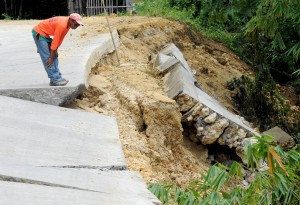CEBU CITY—A week after the 7.2 earthquake that struck Bohol, several families have fled to other places to escape the aftershocks and recover from their trauma.
The Dizon family from Pangangan Island in the municipality of Calape are among those who decided to leave their homes and stay with relatives in Davao City.
Jane and her husband Dexter brought a suitcase with them and a couple of backpacks, mostly filled with the clothes of their children, 7 and 8 years old.
Her sister in Singapore booked a ticket for four to Davao City via Cebu for them to spend a couple of weeks in a place where the earth below them does not shake.
Jane and her family had been living on open space near their house in Barangay Lomboy since the 7.2 magnitude temblor struck in the morning of Oct. 15.
“We spent a week inside a tent because it was too risky for us to get inside our house. There are cracks and broken glasses everywhere,” Jane said in a telephone interview. Inside the tent, her family had to endure the extreme heat from the sun and heavy downpours at night.
“It was too cold for us to get better sleep. My kids often complained of wet grounds and cold air. We barely even ate due to lack of food,” Jane recalled. The family relied only on relief goods distributed by the local government and some private individuals.
Jane and Dexter, who are both public high school teachers, decided to leave the island upon learning that classes had been suspended until Nov. 4.
“We are looking forward to having sound sleep, enough food and water, and to recover from the trauma,” she added.
Jane also disclosed that some other families in their barangay had also left for such places as General Santos City, Palawan, and Manila. Relatives paid for their transfer to help them escape the continuing tremors.
The Cavalida family also escaped from Bohol and sought shelter with relatives in Cebu.
Cecile and her two sons, Cj, 8, and Ace, 14, walked from Pangangan island to the mainland and rode a tricycle to Tubigon, where they boarded a fastcraft to Cebu.
“We borrowed money from a relative for our fare. My husband then sent us money, which we were able to claim when we arrived in Cebu,” said Cecile. Her husband Armel works as a fisherman in Saudi Arabia.
Cecile and her eight-year-old son, CJ, were having breakfast when the earthquake struck. Her oldest son was on a bus on his way to school.
“The bus stopped and we were like thrown from our seats. We didn’t know what was happening, until we saw the ground crack,” said Ace, 14, who later arrived home on a habal-habal, the name of motorcycles used as commercial transport for paying passengers.
Her husband, Armel was very worried about his family’s condition, Cecile said.
Their home, which was part wood and part concrete, is intact but with cracks, she said. Following the earthquake, the family refused to stay because of the aftershocks.
“We stayed on open ground along with other relatives. We decided to take a vacation for a week because I felt that if we did not take a break, we might lose our minds,” said Cecile, adding they lacked sleep, food and water.
“We know people who were in such shock due to earthquake that they no longer speak and don’t even want to eat. If we stayed longer and didn’t take a break, we might end up just like them,” Cecile said.
She said the tremors were much stronger in Bohol than in Cebu.
“Because in Cebu, we don’t wake up at dawn when there are aftershocks. In Bohol, we hardly ever slept,” she said.
Cecile and her two sons decided to go back to Bohol on Wednesday to start their recovery from the devastation.
“We can’t forever escape from the calamity. Sometimes, we just have to pray and be strong enough to get back up. I will have my home repaired, and my kids will get back to school when classes resume,” she said.
